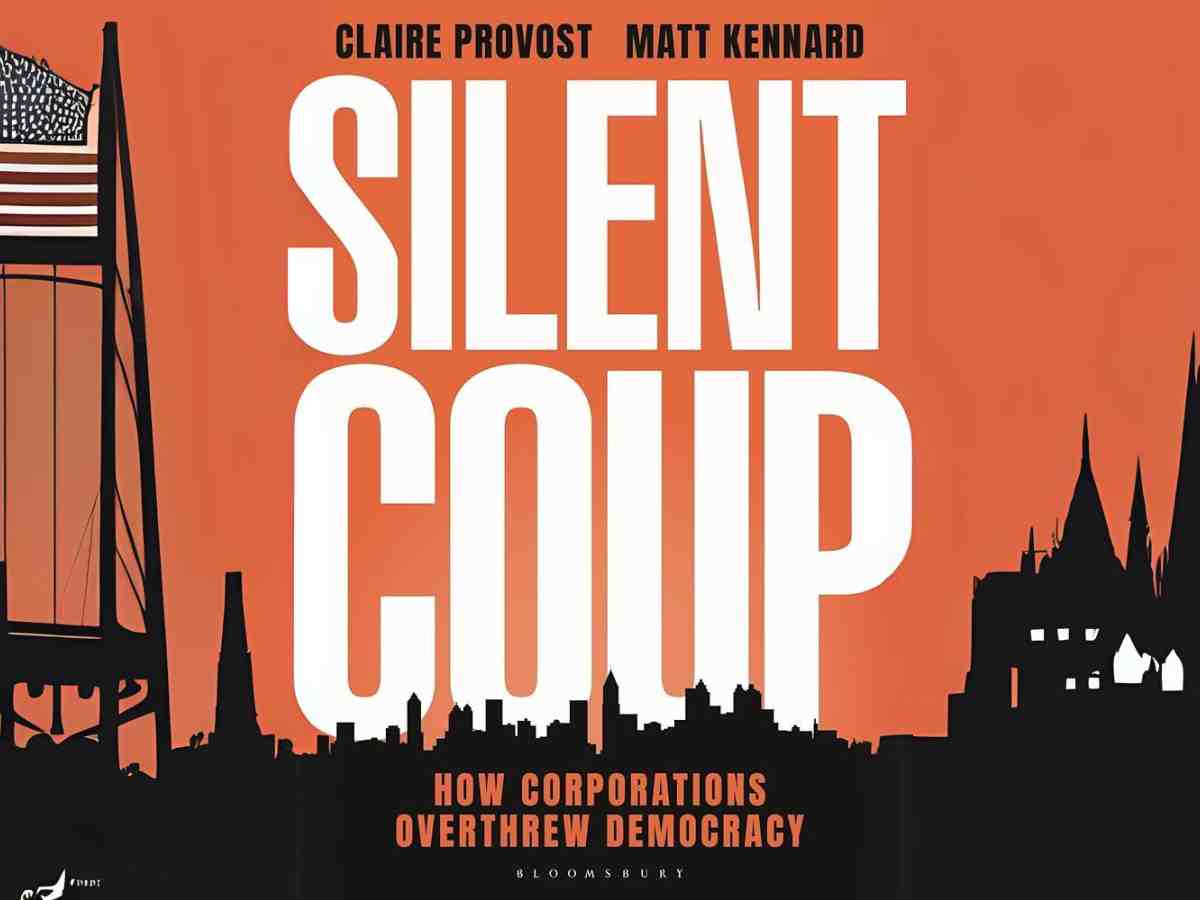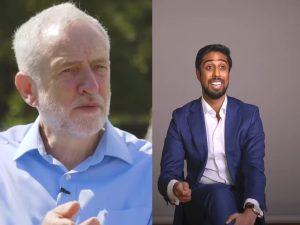The excellent and massively important Silent Coup: How Corporations Overthrew Democracy is now available in paperback. To mark the occasion, we spoke to its co-author Matt Kennard. And we delved into the book, including a powerful new foreword from Jeremy Corbyn.
As Kennard and co-author Claire Provost write, a key reason for reading the book is that:
To have hope for a better future we must know more about both of these things: how corporations have stolen our power, and how we can work to get it back.
Because of the extreme corporate bias of our mainstream media, however, most people don’t hear about either the architects of the current system or the people around the world resisting that system. And that’s where the book comes in.
It hopes to inform and empower readers by providing not only proof of the silent coup that has occurred, but also of “examples around the world of local communities winning, against the odds, battles against transnational corporate power”. As the authors insist:
Hidden scripts and untold stories – once found – can be torn up, or built on.
Kennard: we can run economies democratically
The Canary asked Kennard about the structure of the book, and he said “We started on the international legal system that allows corporations to sue states then discovered each subsequent section as we went”. The “information we were finding”, he added, “guided us to the next element of corporate control that we felt we had to look at”. And he stressed that:
There is some overlap between all the sections because this is a massive infrastructure that is all linked by design. It operates as a strait-jacket that seeks to make it impossible for any so-called sovereign government to move against corporate power.
Within this infrastructure of corporate control, he stated that “the aid industry is particularly important because it gives the system a patina of altruism and ‘doing good’, so it is supported by many well-meaning people”. He continued:
One of the biggest revelations I had doing the reporting from 25 countries was that nearly all corporate projects in the developing world are supported by some aid money of some sort. This money often insures them against risk and allows them to get cheap loans.
The whole capitalist system is undergirded by the aid industry which operates as a state insurance and subsidy mechanism to the corporate sector. It goes against everything about how we are told capitalism works.
I’m not against aid as an idea if it was done as it is presented, but agencies like the World Bank are concerned with upholding a certain neoliberal way of managing economies around the world and because they have all the credit it is very hard for countries to say no and take a different course in terms of a development model.
But one thing that shines through is the way the book shares stories of hope. As Kennard told the Canary:
Everywhere we went we saw the other side of this corporate takeover, which was resistance by the people on the ground.
Literally nowhere I went was this system not being opposed by groups of differing size and strength. In El Salvador we saw a huge mobilisation against ISDS after their country was sued for not granting an environmental permit to a mining company.
In Argentina we saw the amazing advances made in the ‘fabricas nomads’ (taken factories) which grew up after the cataclysmic financial crisis in the country in 2001. Workers took control of the companies that went bust and ran them themselves.
There were difficulties and obstacles but they still exist to this day and give a taste of what is possible if power is wrenched back to workers and how our economy could be run along democratic lines, if they were allowed.
Silent Coup: the road to dystopia and the road away from it
Although the story of corporate control goes back to colonial times, the authors explain in the book, it was only after the end of the Cold War that the offensive really ramped up. With the Soviet Union out of the way:
Each of the areas of global corporate power we look at – control over laws, economies, territories and the use of force – reached dizzying new heights.
There has been resistance, though. And one example they give is the Zapatista movement in southern Mexico, which proved that the success of the global elite’s power grab is not inevitable.
The authors highlight in particular how ‘joint-stock companies’ (which raise money by promising a share in future profits) were a crucial part of the colonial story. Bit by bit, these companies escaped from the regulation of nation states. In some cases, corporations have even ended up running “whole cities and territories”. And thanks to legal professionals, they have risen to the status of “legal ‘persons’, with corresponding ‘rights’ and protections”.
In 2023, for example, Kennard and Provost explain that elite backers of Donald Trump set out to “sue Mexico for $3 billion in land dispute with peasants”. This came after the Mexican government had finally ordered corporate giant Amway to return land they had reportedly purchased illegally many years before. But that’s not the type of story the corporate media is fond of sharing. So as the authors insist, stories like these from the book “are too often unfolding above our heads and in the shadows.
If the dominance of corporations continues, they stress, it won’t be possible to avoid the most severe consequences of the climate crisis we’re living through. Campaigners, however, are ramping up efforts to “block or dismantle structures benefitting corporations at the expense of people and the environment, while also building new structures and rewriting the rules for a better future”.
Legal warfare, foreign aid, ‘special zones’, and private-sector mercenaries
Summarising the four main parts of the book, Kennard told the Canary:
The first section deals with the investor-state dispute settlement (ISDS) system which is a legal mechanism which allows multinational corporations to sue governments all over the world for enacting policies they don’t like, from not granting environmental permits to increasing the minimum wage.
The second section focuses on so-called foreign aid, which most people think of string-free gifts from the rich world to the poor. This is a completely misplaced assumption. Aid actually developed as a way to repackage economic imperialism after decolonisation after World War 2. Many of the institutions which compose the ecosystem, from USAID to World Bank, are about greasing the entry of corporations into new markets, and subsiding the corporations at the same time.
The third section deals with what are called Special Economic Zones or Economic Processing Zones, there’s many names. But what they are is carved out pieces of territories where corporations often don’t have to abide by national laws to do with taxation, customs, duties, labour rights, a whole panoply of different carve outs. There are now thousands of them around the world and extreme neoliberal policies are piloted in them and then rolled out at a national level.
The last section deals with the privatisation of the use of force in our society, whether that be the proliferation of private military contractors helping nation states fight wars, or private security guarding gated communities and other corporate sites around the world. This has huge import for our political systems as the right to the ‘legitimate use of force’ has up until recently always rested with the nation state through the military and police and other agencies. This is now moving to the private sphere, which is thus far completely unregulated.
Corbyn: Silent Coup will inform, empower, and activate people
In Jeremy Corbyn’s foreword to the book, he explains how global corporations filled the power vacuum that European empires left behind and used their power to “sabotage the growth of democracy”. But he insists that they’re vulnerable when ordinary people are actually aware of what they’re doing.
A case in point, regarding the awful behaviour of private corporations, is “how the water companies pollute British rivers and seas by letting raw sewage flow into them”. Although the current government may not be a fan of the idea, he stresses that the obvious solution is to “tell them to bog off and take our water utilities into public ownership”. And if people saw through the corporate PR and really knew about all of the other horrors going on, they would say much the same thing.
Praising Silent Coup, he stresses that:
This book demonstrates, with many examples, how a silent yet steady takeover of government and the economy by corporate power means we are faced with a combination of corporate greed, consumerism and a media that is not prepared to investigate the reality of what is happening in front of them.
A group of Colombian land rights campaigners once told him “political power comes from the power of communities to influence and pressurise those in government”. And the ability to do that, he says, depends on the information those communities have. “To inform people is to empower and activate them”, he insists, and that’s what Silent Coup does.
Kennard: join a union and support independent media
Kennard agrees that the information in the book is about empowering people to fight back. As he told us when speaking about the action he would like people to take after reading the book:
I think the most important thing is to spread the knowledge. This system gets away with all the exploitation and rapacity because it operates in the shadows. We need people to understand the intricacies of the corporate system because when they do they understand that it is about stealing resources and ransacking the poor, the same dynamic since the age of empire began.
He added:
Then we need to build up the only force that can challenge this system on the scale it needs to be challenged: organised labour. Join a union and most importantly make that union democratic and responsive to workers.
And finally, he stressed:
All the revelations and analysis in the book is impossible to get into the mass media because it is largely owned by the forces we are exposing. We need to build a new media independent of corporate and state control that provides a truthful account of who and what runs our society untainted by the powerful forces which do not want the truth to come out.
I am hopeful that we are making advances in this regard with outlets like the Canary, Declassified UK and many others. It’s a long-term project but is the most important part of any move towards to creating a world and global economy that is run in the interests of people not concentrated wealth and power.
We highly recommend reading the book, which you can get here.
Featured image supplied




